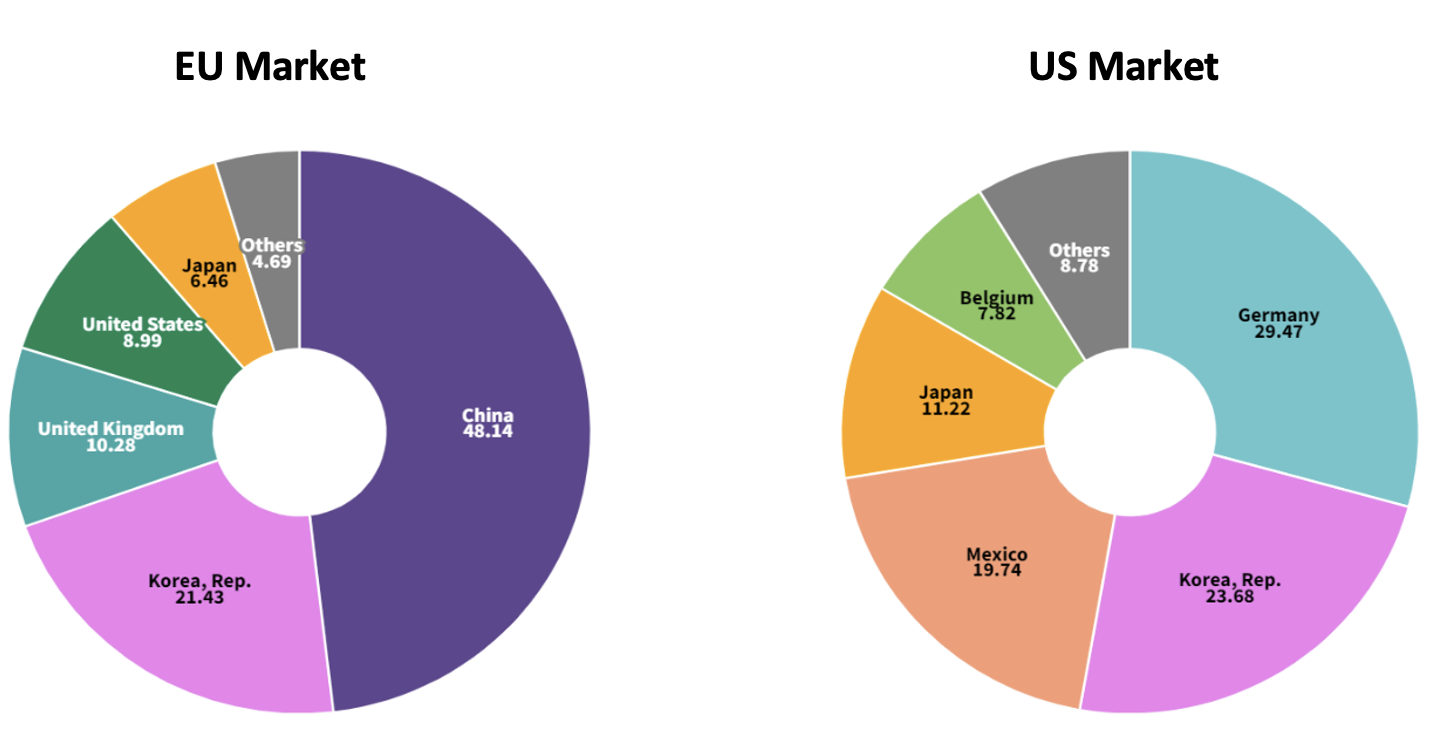
 7 October 2021
7 October 2021
Minako Morita-Jaeger is a Policy Research Fellow of the UK Trade Policy Observatory and a Senior Research Fellow of the University of Sussex Business School. Guillermo Larbalestier is Research Assistant in International Trade at the University of Sussex and Fellow of the UKTPO.
Trade policy concerns, national security and defence are increasingly intertwined in the Indo-Pacific region. This is partly driven by geo-political strategic interests and Sino-US rivalry in the Asia-Pacific region, and partly by the shifting economic balance of power towards the region. China formally applied to join the Comprehensive and Progressive Agreement for Trans-Pacific Partnership (CPTPP) on 16 September, one day after Australia, UK and the US announced the creation of the new security partnership: Australia-UK-US (AUKUS). This should also be seen in the context of the Biden administration’s China containment strategy and an absence of US leadership in trade policy since the Trump era due to a greater focus on domestic priorities. China is thus trying to use the CPTPP as a tool in the geo-political power game in the Asia-Pacific region. By joining the CPTPP, China aims to cement its lead in trade and economic cooperation following the successful conclusion of the Regional Comprehensive Economic Partnership (RCEP), signed last December though not yet in effect.[1] (more…)
Charlotte Humma October 7th, 2021
Posted In: UK - Non EU
Tags: China, Comprehensive and Progressive Agreement for Trans-Pacific Partnership, CPTPP, Indo-Pacific
June 28, 2024 Anupama Sen is a Research Assistant in International Trade (Economics) at the UKTPO.
Anupama Sen is a Research Assistant in International Trade (Economics) at the UKTPO.
For nearly a decade, China has been the linchpin of global supply chains, thanks to its competitive labour costs and vast manufacturing prowess, earning it a moniker as the ‘factory of the world’. China’s strong manufacturing position extends to the automotive industry. Against that backdrop, starting on 4 July 2024, the EU will implement tariffs, in the form of countervailing duties (CVDs) ranging from 17% to 38%, on Chinese electric vehicles (EVs). These duties on Chinese EV imports will be on top of an existing 10% duty, thereby reaching a peak of 48%. The decision to levy further duties follows an investigation by the European Commission launched in October to investigate Chinese subsidies distorting EV prices and posing unfair competition risks to European carmakers. Thus, the tariffs are applied on a company-specific basis, tailored to the level of subsidies allegedly received by Chinese firms.
The EU’s tariffs on Chinese EVs could be seen as a strategic move aimed at reducing its dependency on China in this sector whilst at the same time stimulating domestic EV production. While some may view this policy as protectionist or neo-mercantilist, it could alternatively be seen as a prudent industrial strategy to foster economic resilience for the EU and to create a level playing field in the global market for EVs. This blog explores the necessity for such a strategy, supported by data illustrating the EU’s growing reliance on Chinese EV imports.
Imports of Chinese produced EVs into the EU market have increased significantly over recent years. Table 1 presents the import values for the car industry and electric vehicles (EVs) from 2017 to 2023, while Figure 1 shows the share of EVs within the total car industry imports. The share of EV’s in total car imports from China rose substantially from 3.2% in 2017 to 81.6% in 2021, with a slight rebound thereafter. While it is difficult to pin down any single specific factor that led to this surge in EV imports in 2021, by then China’s EV industry had grown substantially. This was in part due to substantial state subsidies that enabled manufacturers to offer EVs at competitive prices. Additionally, the EU’s commitment to green energy, including incentives from the 2019 Green Deal, had made the market more receptive to EV imports. Lower trade barriers for Chinese EVs in the EU compared to regions like the U.S. also facilitated this surge. However, EU imports from China have been rising in absolute terms throughout the entire period, in both EVs and non-EVs.
|
Year |
Car Industry (billion USD) HS 8703 |
Electric Vehicles (billion USD, HS 870380) |
|
2017 |
0.46 |
0.01 |
|
2018 |
0.61 |
0.02 |
|
2019 |
1.02 |
0.07 |
|
2020 |
2.06 |
0.91 |
|
2021 |
7.03 |
5.74 |
|
2022 |
9.94 |
7.23 |
|
2023 |
13.96 |
10.47 |
Source: UN Comtrade
Notes: Figures are in billion USD. HS code 870380 refers to: Motor cars and other motor vehicles principally designed for the transport of <10 persons, incl. station wagons and racing cars, with only electric motor for propulsion (excl. vehicles for travelling on snow and other specially designed vehicles of subheading 8703.10).

Source: Author’s Calculation on Import data from 2017 to 2021 using UN Comtrade
Whereas the EU has implemented tariffs on Chinese EVs in the face of a huge surge in imports, the United States has imposed even higher tariffs of up to 100% on Chinese EV imports despite minimal penetration of these vehicles in its market. Unlike the EU with its heavy reliance on China, the US has diversified its EV supply chain primarily through suppliers in Germany, Korea, and Mexico. This difference underscores how the EU’s approach is potentially consistent with addressing concerns about economic vulnerabilities and promoting local industry growth. In contrast, the US strategy focuses more on safeguarding its existing supply chain diversification.
Figure 2 shows the largest suppliers of EVs to the EU and US markets, respectively. We can observe how heavily reliant the EU is on China as the largest supplier of EVs by a wide margin, whereas the US has been able to diversify its supply chain sufficiently among other exporters.

Source: Author’s Calculation from UN Comtrade Data
Beyond the economic implications, China has complained that the EU duties contravene WTO rules. The WTO Agreement on Subsidies and Countervailing Measures (SCM Agreement) provides the legal framework for these actions, allowing member countries to impose countervailing duties on subsidized imports harming domestic industries. While differentiating duties by firm is common in anti-dumping cases, it is less familiar in the context of subsidies. This differentiation might initially raise concerns about discrimination. Article 15(2) of Regulation (EU) 2016/1037 allows the EU to impose firm-specific countervailing duties. The SCM Agreement’s silence on this practice implies its likely permissibility due to the absence of an express prohibition.
Moreover, the EU’s regulation includes a separate procedure for calculating duties in cases of non-cooperation, potentially resulting in higher tariffs for such firms. Nevertheless, the basis for selecting specific Chinese companies under investigation remains unclear. Chinese firms receive various forms of support, including preferential interest rates, directed credit, tax credits, and cross-subsidies. The methodology for calculating tariffs has only been circulated to the sampled firms thus far. Until the EU publishes its methodology, it is difficult to fully assess the legal validity of the EU’s differentiated tariffs and how subsidies for each firm have been accounted for, as well as the injury to the EU industry caused by each firm.
The EU’s tariffs on Chinese EVs will have varied economic repercussions. They may serve as a catalyst for Chinese manufacturers to relocate production to the EU. For instance, Chinese carmaker BYD has established EV plants in Hungary, and Geely has shifted production to Belgium. This shift has the potential to attract investment, bolster local manufacturing, stimulate job creation, and enhance EU technological capabilities.
However, the immediate consequence of higher tariffs could be increased costs for consumers as part of the tariff rise will most likely be passed on to them. In addition, more protection for EU producers might shift their focus away from innovating and seeking efficiency gains. Finally, the tariffs may strain EU-China trade relations and prompt retaliatory measures.
Imposing tariffs on Chinese EVs may also jeopardize the EU’s ambitious climate goals, as outlined in the European Green Deal. Higher tariffs are almost surely set to slow down EV adoption rates in the EU, delaying the transition away from fossil fuel-powered vehicles and hindering progress towards achieving net-zero emissions by 2050. Additionally, efforts to boost local EV production in response to tariffs may temporarily raise CO2 emissions during manufacturing, particularly in energy-intensive battery production. Striking a balance between trade policies and environmental objectives is crucial to ensure that measures such as CVDs support rather than hinder the EU’s carbonization progress.
As the US and EU pivot away from heavy reliance on Chinese manufacturing, they are integrating ASEAN nations (Indonesia, Malaysia, the Philippines, Singapore, Thailand, Vietnam) into their supply networks. These efforts are bolstered by frameworks such as the US-led Indo-Pacific Economic Framework (IPEF) and the Comprehensive and Progressive Agreement for Trans-Pacific Partnership (CPTPP)[1]. This strategic shift underscores the imperative of diversifying supply chains to enhance economic resilience amidst global uncertainties.
In this recalibration, cultivating strategic partnerships—often termed friendshoring—takes on critical significance. These alliances aim to deepen economic collaboration while mitigating risks associated with overreliance on single suppliers. As part of such initiatives, the EU may aim at strategically diversifying its EV supply chain by investing in economies such as Mexico, Japan, and South Korea, thereby enhancing supply chain resilience and reducing dependency on China. India, with its burgeoning EV market, represents a significant opportunity. Notably, in 2023, India surpassed China in three-wheeler EV sales, underscoring its potential as a key player in the global EV industry[2].
The EU’s impending tariff hike on Chinese EVs presents a complex challenge touching on economic, environmental, and geopolitical dimensions. While aimed at protecting European industries from unfair competition, these measures may strain EU-China relations and potentially undermine the EU’s climate goals. Balancing the need to diversify supply chains with environmental goals and political costs is crucial to mitigate risks and ensure sustainable economic growth.
[1] Neither the EU nor the US are part of CPTPP, even though the agreement is shaped on the provisions negotiated for the Trans Pacific Partnership (TPP). This latter was heavily influenced by the US, although it withdrew from it in 2017 and CPTPP came into effect between 11 signatories in 2018. The UK signed an accession protocol in 2023.
[2] https://www.cnbc.com/2024/04/26/india-says-new-ev-policy-will-open-up-market-to-global-players-.html
Disclaimer:
The opinions expressed in this blog are those of the author alone and do not necessarily represent the opinions of the University of Sussex or UK Trade Policy Observatory.
Republishing guidelines:
The UK Trade Policy Observatory believes in the free flow of information and encourages readers to cite our materials, providing due acknowledgement. For online use, this should be a link to the original resource on our website. We do not publish under a Creative Commons license. This means you CANNOT republish our articles online or in print for free.
Jessie Madrigal-Fletcher June 28th, 2024
Posted In: Uncategorised
Assessing the economic potential from the CPTPP
Political and institutional dilemmas that can arise from expansion
On 16th July 2023, the UK Government announced that it had signed the Protocol of Accession to become a member of the Comprehensive and Progressive Agreement for Trans-Pacific Partnership (CPTPP). The UK will be the first new member of the bloc and the only member outside the Asia Pacific region and the Americas. The agreement will enter into force after all ratification processes are completed. (more…)
Jessie Madrigal-Fletcher July 24th, 2023
Posted In:
 31 March 2023
31 March 2023
Minako Morita-Jaeger is Policy Research Fellow at the UK Trade Policy Observatory and Senior Research Fellow in International Trade in the Department of Economics, University of Sussex
On 31st March, the UK announced an agreement in principle to become a member of the Comprehensive and Progressive Agreement for Trans-Pacific Partnership (CPTPP). Politically, this is a positive step, especially as the Prime Minister can sell accession as a tangible achievement of the UK’s independent trade policy. But what is the real value of joining the CPTPP, and what are the key issues to examine? (more…)
Cosmo Rana-Iozzi March 31st, 2023
Posted In: UK - Non EU
Tags: Comprehensive and Progressive Agreement for Trans-Pacific Partnership, CPTPP, Free Trade Agreement, Indo-Pacific, Pacific, trade, Trade agreements, trade negotiations, trade policy, UK economy, UK-Japan
Does CPTPP threaten UK food standards?
Access to the regulatory/risk assessment process
Differences between the CPTPP SPS Chapter and existing UK FTAs
Does CPTPP accession prevent the UK from agreeing to continued regulatory alignment with the EU?
George Meredith July 28th, 2021
Posted In:
What is the direction of travel suggested by the five of the latest agreements?
George Meredith July 28th, 2021
Posted In:
Share this article: ![]()
![]()
![]()
![]()
![]()
![]()
 16 April 2021
16 April 2021
Minako Morita-Jaeger is an International Trade Policy Consultant and Fellow of the UK Trade Policy Observatory at the University of Sussex.
On 1st February, the UK asked to join the Comprehensive and Progressive Agreement for Trans-Pacific Partnership (CPTPP)[1]. While the request appears motivated more by foreign policy than economic benefit, joining the CPTPP will require the UK to accept CPTPP rules which may impact on UK economy and society in specific ways. (more…)
George Meredith April 16th, 2021
Posted In: UK - Non EU
Tags: CPTPP
Share this article: ![]()
![]()
![]()
![]()
![]()
![]()


 3 February 2021
3 February 2021
Michael Gasiorek is Professor of Economics and Director of the UKTPO. Guillermo Larbalestier is Research Assistant in International Trade, and Nicolo Tamberi is Research Officer in Economics, both for the UKTPO.
As widely anticipated and signalled in advance, the International Trade Secretary announced on Monday 1 February that the UK notified the Comprehensive and Progressive Agreement for Trans-Pacific Partnership (CPTPP), of its intention to join. The CPTPP is a free trade agreement between 11 ‘Pacific’ countries which was signed in 2018.[1] This is an early step in the UK’s newfound and hard-won sovereign and independent trade policy. (more…)
George Meredith February 3rd, 2021
Posted In: UK - Non EU
8 June 2023


 Michael Gasiorek is Director of the UK Trade Policy Observatory and Co-Director of the Centre for Inclusive Trade Policy. He is Professor of Economics at the University of Sussex Business School. Peter Holmes is a Fellow of the UK Trade Policy Observatory and Emeritus Reader in Economics at the University of Sussex Business School. Manuel Tong Koecklin is a Research Fellow in the Economics of Trade at the UK Trade Policy Observatory and University of Sussex Business School.
Michael Gasiorek is Director of the UK Trade Policy Observatory and Co-Director of the Centre for Inclusive Trade Policy. He is Professor of Economics at the University of Sussex Business School. Peter Holmes is a Fellow of the UK Trade Policy Observatory and Emeritus Reader in Economics at the University of Sussex Business School. Manuel Tong Koecklin is a Research Fellow in the Economics of Trade at the UK Trade Policy Observatory and University of Sussex Business School.
Recently, there have been a series of reports in the media focussing on the challenges that electric vehicle (EV) manufacturers are likely to face, from the end of this year, in exporting electric vehicles tariff-free to the EU. The concern it because of the changes in the rules of origin (ROOs) requirements (for EVs and batteries) which will become more difficult from January 2024, and again from 2027 and 2028 onwards. (more…)
Jessie Madrigal-Fletcher June 8th, 2023
Posted In: UK- EU
Tags: Brexit, EU, Europe, goods, Single Market, TCA, Trade and Cooperation Agreement, trade policy, UK economy
9.15 – 9.45 Registration & Coffee (30 minutes)
9.45 – 10.00 Welcome and introduction (10 minutes) – Emily Lydgate (UK Trade Policy Observatory/University of Sussex)
10.00-11.00 – Session 1: Post-Brexit trade
11.00 – 11.30 – Coffee Break
11.30-12.30 – Session 2: Climate and trade
12.30 – 13.30 – Lunch
13.30-15.00 – Session 3: Digital Trade
15.00 – 15.30 – Coffee Break
15.30-16.30 – Session 4: Sustainable Trade
16.30-17.15 ROUNDTABLE: What role for FTAs in trade policy? – Chair: Michael Gasiorek (UK Trade Policy Observatory/University of Sussex). Panel: Emily Lydgate (UK Trade Policy Observatory), David Henig (European Centre for International Political Economy), Ian Shepherd (Department for International Trade, UK Government)

Camilla Jensen is a Senior Research Fellow in international trade with the UK Trade Policy Observatory at the University of Sussex and an Associate Professor in Economics at Roskilde University, Denmark. She has a background in cultural studies, and a PhD in Economics from SDU, Denmark. She has taught international business and comparative economic systems at Copenhagen Business School and Copenhagen University. Now she teaches a mix of public economics and international economics at Roskilde University. Camilla’s research in international trade focuses on topics related to multinational firms, host country economic systems, sustainable development and how political and climate risks are affecting and being affected by international trade. She has done commissioned work for LEGO, DANIDA, CASE (Warsaw), the FCDO (Beijing), the European Commission, the European Parliament and Center for Regional and Tourism Research (Bornholm, DK).
 UK Trade in the Wake of Brexit
UK Trade in the Wake of BrexitThomas Sampson is an Associate Professor of economics at the London School of Economics. His research studies the impact of globalisation on workers, firms and productivity. Thomas is also an academic adviser to the Bank of England and an associate at the Centre for Economic Performance where he has worked extensively on the economic consequences of Brexit. Prior to joining the London School of Economics, Thomas worked as an Overseas Development Institute Fellow at the Bank of Papua New Guinea and obtained a PhD in economics from Harvard University.
This paper studies the impact of Brexit on the UK’s trade with the EU relative to its trade with the rest of the world. We find no evidence that uncertainty and anticipation effects led to a significant decline in relative UK trade with the EU during the period after the UK voted for Brexit in 2016 and before the change in policy was implemented under the new Trade and Cooperation Agreement (TCA) in 2021. However, the UK’s departure from the EU’s single market and customs union at the start of 2021 caused a major shock to UK-EU trade. We estimate that the new TCA trade relationship led to a sudden and persistent 25% fall in relative UK imports from the EU. In contrast, we find a smaller and only temporary decline in relative UK exports to the EU, but nevertheless a large and sustained drop in the extensive margin of exports, driven by the exit of low-value relationships. The timing and asymmetry of Brexit effects on UK imports and exports is puzzling and provides evidence of important differences in adjustment to integration and disintegration shocks.
 The Welfare Effects of Leaving the EU
The Welfare Effects of Leaving the EUNicolò Tamberi is a Research Officer in Economics at the UK Trade Policy Observatory at the University of Sussex, as well as a PhD student in Economics at the University of Sussex. His interests are international trade and political economy and he holds a BSc in Economics from Universita’ Politecnica delle Marche and an MSc in International Economics from the University of Sussex. He has worked as a consultant on trade policy issues for different government departments.
This paper evaluates the welfare effects of leaving the EU. This is done in three steps. First, I estimate trade barriers imposed by the TCA looking at changes in UK-EU trade in goods and services. Second, I use the 2021 change in UK’s MFN tariff to estimate the trade elasticity accounting for the endogeneity of tariff changes. Finally, I use the estimated trade barriers and elasticities in a modern general equilibrium trade model with input-output linkages. Results point to welfare changes of -1% for the UK and -0.1% for the EU in the first year of the TCA. The cut in UK’s MFN tariff softened the loss by 0.1pp for the UK.
 Chair: Alasdair Smith (UK Trade Policy Observatory, University of Sussex)
Chair: Alasdair Smith (UK Trade Policy Observatory, University of Sussex)Alasdair Smith is an international trade economist, with special interests in the economics of European trade and integration. He has written widely cited papers on the economics of the single market and on the Eastern enlargement of the EU; as well as more widely on trade and income distribution, competition policy, intertemporal economics, the economics of pensions, and the principles of microeconomics policy. With Tony Venables and Michael Gasiorek, he developed a set of computable modelling techniques which they applied in the 1980s to the economics of the single market and more recently to the modelling of Brexit issues. He has had direct practical experience in higher education policy, public sector pay, pension, competition policy, fiscal devolution, and payment systems. As well as academic books and papers, he has extensive experience in writing on economic policy issues for wider audiences and of undertaking economic consultancy work for public bodies. He is a researcher within the UK Trade Policy Observatory and Centre for Inclusive Trade Policy (CITP).
 Giulia Claudia Leonelli (Birkbeck, University of London)
Giulia Claudia Leonelli (Birkbeck, University of London)Dr Giulia Claudia Leonelli is Lecturer in Law at Birkbeck College, University of London, and Research Fellow at the Transnational Law Institute, King’s College London. She was awarded a PhD in Law by King’s College London, where she was also Postdoctoral Fellow. Her current research projects lie at the intersection of trade and environmental law, with a particular focus on climate change law aspects. Her research has been published in leading academic journals. Dr Leonelli has contributed written evidence to inquiries of the House of Commons International Trade Committee and the House of Lords International Agreements Committee and is a Member of the TaPP Network.
Unilateral carbon border measures have been in the spotlight since the 2021 publication of the European Commission’s proposal for a carbon border adjustment mechanism (CBAM). In the meantime, discussions on the establishment of plurilateral climate clubs have developed in the background. This presentation critically assesses different regulatory models for plurilateral climate club arrangements, focusing on their respective advantages and shortcomings. It advocates adherence to top-down or bottom-up models involving recourse to product standards and bans.
 Wusheng Yu (University of Copenhagen)
Wusheng Yu (University of Copenhagen)Wusheng Yu is a Professor with the Department of Food and Resource Economics, University of Copenhagen, Denmark, where he coordinates a research group on markets and policy and teaches graduate courses in international trade and computational models. His main areas of research are agricultural policy, international agricultural trade, trade policy, computable general equilibrium modeling, and the intersection of food security, international trade, and climate change mitigation. For his contributions to CGE modeling, he has been named a GTAP Research Fellow. His research has been funded by a series of EU FP and H2020 programs and a number of other public and private funding bodies. He is currently leading a research program on the future of animal sourced food products. He has consulted for a number of international organizations and national governmental ministries/agencies.
Professor Yu received his economics training from China (MSc, Renmin University of China) and the USA (PhD, Purdue University).
 Francesco Clora (University of Copenhagen)
Francesco Clora (University of Copenhagen)Francesco Clora is a Postdoctoral Researcher at the Department of Food and Resource Economics, University of Copenhagen, Denmark. His research explores the interactions between climate change mitigation, international trade, and trade policy, focusing on (but not limited to) the European Union and the agri-food sector. He is currently involved in the FutureAnimalFood project, and has previously been involved in the European Calculator Horizon 2020 project. He teaches international economics, international trade, and computable general equilibrium modeling.
Francesco Clora has received his economics education in Denmark (PhD and MSc, University of Copenhagen) and in Italy (BSc, Padua University).
The European Union (EU) recently declared its intention to implement a carbon border adjustment mechanism (CBAM) to address carbon leakage and competitiveness concerns associated with elevated climate ambitions in its Green Deal. Current literature points to uncertainties regarding the CBAM’s effectiveness and compatibility with international trade rules. This study numerically evaluates how alternative EU CBAM designs under various international reactions affect global and regional GHG emissions, outputs and trade flows.
Our modeling results confirm substantial carbon leakages and reductions in outputs in the EU’s emissions-intensive trade-exposed (EITE) sectors when implementing the Green Deal. We show that the design of the CBAM matters: while a “non-discriminatory” CBAM based on the EU’s own scope 1 emission intensities fails to effectively reduce leakages, an ‘aggressive’ CBAM based on exporters’ scope 1 & 2 emission intensities can achieve such goal (albeit with potentially high implementation cost). International retaliations by non-EU countries can only partially offset the EU’s gains from the ‘aggressive’ CBAM, while their cooperation can result in smaller losses to the EU EITE sectors and lower leakages. Finally, the CBAM cannot change within-EU imbalances in the EITE sectors, as several EU members lose EITE outputs consistently in all scenarios with and without retaliations.
 Chair: Ingo Borchert (UK Trade Policy Observatory, University of Sussex)
Chair: Ingo Borchert (UK Trade Policy Observatory, University of Sussex)Ingo Borchert is a Reader in Economics at the University of Sussex Business School, Deputy Director of the UK Trade Policy Observatory (UKTPO), and part of the leadership group of the Centre for Inclusive Trade Policy (CITP). He is a recognised expert in international trade in services and has published in leading academic journals on the international integration of services markets. His expertise also encompasses digital services, cross-border data flows and structural gravity modelling of trade and trade costs. He has served as an Economist at the World Bank from 2008-11, where he co-created the global “Services Trade Policy Database” under the auspices of the World Bank and the WTO. He has been an invited speaker on services policies at the OECD, WTO and APEC, has advised the UK House of Lords on services trade, and has given evidence before UK House of Commons committees. He holds a PhD in Economics and Finance from the University of St. Gallen, Switzerland.
 Javier López-González (Organisation for Economic Cooperation and Development)
Javier López-González (Organisation for Economic Cooperation and Development)Dr. Javier López-González is a Senior Economist at the Trade and Agriculture Directorate of the OECD where he leads the work on digital trade. His recent work includes: developing frameworks for the analysis and measurement of digital trade, exploring what market openness means in the 21st century; investigating regulatory approaches to cross-border data flows; and identifying potential economic costs and benefits of digital trade. He has previously worked on the drivers and implications of participation in global value chains. Javier holds a PhD in Economics from the University of Sussex.
Although it is widely acknowledged that digital connectivity and digital trade policies matter for trade, their quantitative importance has been difficult to capture. This paper provides new evidence on the nature and evolution of digital trade and highlights how digital connectivity and digital trade policies affect trade and trade costs. Using proxy measures, the paper shows that digital trade has been growing and could represent as much as 22% of global trade in 2018. It also suggests that the geography of digital trade is shifting away from OECD countries and towards emerging economies, and that digital trade is becoming more services oriented. The econometric analysis shows that a 10% change in bilateral digital connectivity leads to an increase in trade of 3%, impact which has been rising in time. The paper also shows that digital trade policy measures affecting infrastructure and connectivity, which include conditions on the flow of data and data localisation measures, are those that most negatively impact trade flows. Overall, the paper underscores the importance of engaging in digital trade policy discussions, whether domestically, in RTAs or at the WTO.
 Minako Morita-Jaeger (UK Trade Policy Observatory, University of Sussex)
Minako Morita-Jaeger (UK Trade Policy Observatory, University of Sussex)Dr. Minako Morita-Jaeger has been working intensively on international trade policy across the globe for decades. Prior to her research work in academia from 2010, she gained practical experience as an economic affairs officer at the UNCTAD; as a WTO services trade negotiator at the Japanese Delegation in Geneva; and as a principal trade policy analyst at the Keidanren (Japan Business Federation). Her areas of expertise include: Free Trade Agreements; WTO; Asia-Europe trade relations; UK trade policy; services and digital trade; and regulatory cooperation. She holds a PhD in International Political Economy from the LSE; an MA in European Economic Studies from the College of Europe; an MA in International Law and Economics from the World Trade Institute; and a BA in economics from Keio University.
The UK is facing regulatory constraints on digital trade to join the CPTPP since the UK is a country with different regulatory standards based on European societal norms and values. It is true that the UK has already departed from the EU style digital trade governance by concluding the innovation and market efficiency focused digital trade provisions with some CPTPP members including Australia, New Zealand, Japan and Singapore. And the CPTPP digital trade provisions are narrower and shallower thanthese ambitious agreements. However, the CPTPP is different. There are huge data governance gaps between the UK and the CPTPP members and the ethical, trust, and human rightsconsiderations are much weaker than those in the UK. Accommodation to some CPTPP digital provisions, such as data privacy and strict public policy exceptions in relation with free cross-border data flow, may intensify societal concerns in the UK and may even endanger the EU’s adequacy decision to the UK.
 Susan Ariel Aaronson (George Washington University)
Susan Ariel Aaronson (George Washington University)Susan Ariel Aaronson is Research Professor and Director of the Digital Trade and Data Governance Hub at George Washington University (GWU) in Washington D.C. The Hub maps the governance of personal, public and proprietary data around the world and examines how it affects data driven tech, human autonomy and human rights. The Hub also trains policymakers in data-governance, digital trade and emerging tech such as spatial computing (metaverses) and AI. Aaronson is also a Senior Fellow at CIGI. She is the author of 6 books and over 80 articles on digital trade, data governance, human rights, corruption, and good governance. Aaronson is currently finishing or revising articles on:
She loves to do triathlons and study ballet and admits she Is mediocre at these activities.
Global data sharing can help address what scholars call wicked problems—problems so complex that they require innovative, cost effective and global mitigating strategies. Many factors impede global data sharing for public good purposes; this analysis focuses on two. First, policymakers generally don’t think about data as a global public good; they view data as a commercial asset that they should nurture and control. While they may understand that data can serve the public interest, they are more concerned with using data to serve their country’s economic interest. Secondly, many leaders of civil society and business see the data they have collected as proprietary data. So far many leaders of private entities with troves of data are not convinced that their organization will benefit from such sharing. At the same time, companies voluntarily share some data for social good purposes. However, data cannot meet its public good purpose if data is not shared among societal entities. Moreover, if data as a sovereign asset, policymakers are unlikely to encourage data sharing across borders oriented towards addressing shared problems. Consequently, society will be less able to use data as both a commercial asset and as a resource to enhance human welfare. This paper discusses why the world has made so little progress encouraging a vision of data as a global public good. As UNCTAD noted, data generated in one country can also provide social value in other countries, which would call for sharing of data at the international level through a set of shared and accountable rules (UNCTAD: 2021). Moreover, the world is drowning in data, yet much of that data remains hidden and underutilized. But guilt is a great motivator. The author suggests a new agency, the Wicked Problems Agency, to act as a counterweight to that opacity and to create a demand and a market for data sharing in the public good.
 Chair: Amrita Saha (Institute of Development Studies)
Chair: Amrita Saha (Institute of Development Studies)Amrita Saha is research fellow at the Institute of Development Studies (IDS) at University of Sussex. She is an economist with a focus on political economy of international trade and development. Her ongoing research focuses on inclusive trade, agriculture, and innovation, and is funded by the ESRC, FCDO and Gates Foundation. At IDS, she also convenes the MA in Globalisation, Business and Development, and the professional short course ‘Making Trade Policy Inclusive’. Amrita holds a PhD in Economics from the University of Sussex. Her past roles have included working with the Commonwealth Secretariat in London; the Ministry of Commerce and Industry in India; and teaching roles at the LSE, SOAS, and University of Sussex.
 Camille Vallier (UK Trade Policy Observatory, University of Sussex and University of Geneva)
Camille Vallier (UK Trade Policy Observatory, University of Sussex and University of Geneva)Camille Vallier is a Research Fellow at the University of Sussex. She works on the Horizon2020 research project “Trade4SD”, which studies the impacts of EU’s FTAs’ sustainability provisions on agri-food production. She is also a lecturer in Environmental Law at the University of Geneva (Switzerland). She holds a PhD in law from the University of Geneva, an LL.M from the University of London (SOAS), and a Bachelor and Master of law from the University of Geneva. Her PhD thesis, entitled “Seeds and Public Law: Food, Health and the Environment” was defended with summa cum laude in January 2021.
This presentation will compare the influence of EU FTA environment chapters, EU regulation and voluntary standards in influencing sustainability of agri-food production in exporting countries. Based on research undertaken in the coffee sector of Vietnam, we will argue that FTA environment chapters have had little influence when they are not combined with other legal tools or instruments.
 Ruby Acquah (UK Trade Policy Observatory, University of Sussex)
Ruby Acquah (UK Trade Policy Observatory, University of Sussex)Ruby Acquah is a Research Fellow of the UK Trade Policy Observatory (UKTPO) at the University of Sussex Business School. Ruby is involved in research on the impact of Brexit on firms and workers in the UK, as well as research on deep trade agreements and sustainable development. She holds a PhD in Economics and Business Economics from Aarhus University in Denmark.
 Mattia Di Ubaldo (UK Trade Policy Observatory, University of Sussex)
Mattia Di Ubaldo (UK Trade Policy Observatory, University of Sussex)Mattia Di Ubaldo is a Research Fellow in Economics at the University of Sussex Business School, and a fellow of the UK Trade Policy Observatory. His current research spans several areas: effects of trade policy on trade, FDI, and non-trade policy objectives; deep trade agreements; Brexit and its impact on firms and workers; sourcing strategies of multinationals. He has published his research in academic journals such as Economics Letters, the European Journal of Political Economy, the Review of Income and Wealth, and the World Trade Review. He holds a PhD in Economics from the University of Sussex.
Preferential Trade Agreements (PTAs) have increasingly been used to promote environmental protection and climate issues, as denoted by the increasing number and variety of specific environmental provisions included in the agreements. The effectiveness of these commitments in helping countries to make progress towards environmental targets is still unclear, however. In this paper we empirically estimate the effect of specific environmental provisions in PTAs on selected environmental targets as defined in the Sustainable Development Goals. We combine a detailed dataset on environmental norms in PTAs with data on a broad range of environmental outcomes, and find heterogenous effects across the various outcomes. Provisions on the use of renewable energy and the reduction of greenhouse gas emissions appear to be particularly effective.
 Chair: Michael Gasiorek (UK Trade Policy Observatory, University of Sussex)
Chair: Michael Gasiorek (UK Trade Policy Observatory, University of Sussex)Michael Gasiorek is Director of the UK Trade Policy Observatory, Co-Director of the Centre for Inclusive Trade Policy (CITP), Professor of Economics at the University of Sussex, and Managing Director of a University spin-out company, InterAnalysis. Michael Gasiorek is a specialist in international trade policy and regional integration with a keen interest in the policy relevance of his work. He has extensive experience in modelling the impacts of changes in trade policy and recent research has focussed on how firms engage in international trade, the impact of Brexit on UK manufacturing, the impact of Brexit on firms in Northern Ireland, and the impact of Generalised Scheme of Preferences preferences on developing country trade. He has published widely in both books and journals, such as the European Economic Review, World Economy, Economic Policy, European Journal of Political Economy, Journal of Common Market Studies, Applied Economics and the European Economy. He has been responsible for the delivery of numerous reports and training programs on trade-related issues inter-alia for the UK governments, the European Commission and the World Bank. InterAnalysis is a company which has developed a software tool, TradeSift, to enable more efficient analysis of trade data. The company offers support on trade policy and trade negotiations in particular for developing countries and delivered training programmes and advice to officials from over 70 countries around the world, much of which has been in-country based.
 Emily Lydgate (UK Trade Policy Observatory, University of Sussex)
Emily Lydgate (UK Trade Policy Observatory, University of Sussex)Emily Lydgate is a Reader (Senior Associate Professor) in Environmental Law at the University of Sussex and Deputy Director of the UK Trade Policy Observatory, a partnership between Sussex and Chatham House. Her research focuses on the relationship between environmental regulation and economic integration through trade. She is a Specialist Advisor to the EFRA Committee (UK House of Commons) and has provided expert testimony for a number of Parliamentary Committees. She is also an instructor for the UK Foreign, Commonwealth and Development Office’s Advanced Diplomatic Academy. She holds a PhD from King’s College London and an MSc (with distinction) from Oxford University. She was a Marie Curie Researcher at Bocconi University and has consulted at the United Nations Environment Programme’s Economics and Trade Branch, where she acted as a WTO liaison. She is currently working on an EU Horizon 2020 grant project on how EU Free Trade Agreements and wider trade policy reflects the goal of securing sustainable agricultural practices, and leading on a report for the UK Committee on Climate Change on trade policy and emissions reduction. She is also on the management team of the Centre for Inclusive Trade Policy. Her research and commentary have been featured in the Associated Press, Marketplace, BBC, CNN, China Daily, Financial Times, Independent, Guardian, New Scientist, Times, Telegraph, Vice, Wired, Xinhua News, and others.
 David Henig (European Centre for International Political Economy)
David Henig (European Centre for International Political Economy)David Henig is Director of the UK Trade Policy Project at the think-tank European Centre for International Political Economy (ECIPE) examining the trade implications of Brexit and UK trade policy. For ECIPE he has also written a series of short papers on globalisation, and writes about broader trade issues in a regular column for specialist trade news service Borderlex. David serves as Expert Adviser to the UK Trade and Business Commission and House of Lords International Agreements Committee. Until March 2018 he worked for the UK Government including on Transatlantic Trade Investment Partnership (TTIP) talks between US and EU, establishing the Department for International Trade, and issues around inward investments from China.
 Ian Shepherd (Department for International Trade, UK Government)
Ian Shepherd (Department for International Trade, UK Government)Ian Shepherd works in a job share as the Policy Director of Trade in Goods, Regulatory Environment and GCC (GREG) at the Department for International Trade with Jen Ashby. Joining the Civil Service around 20 years ago, prior to taking the role as Directorfor GREG, Ian was the head for Canada and Latin America. Prior to this Ian was at the Home Office as the head of Police Integrity and Powers unit and before this he was a policy advisor at the HM Treasury in various roles from Home Office spending to EU budget to education spending as well as International Economics and public spending. Ian’s current role involves leading a large team of around 120 people, who are all specialists in different areas of trade policy.
Cosmo Rana-Iozzi November 21st, 2022
Posted In: